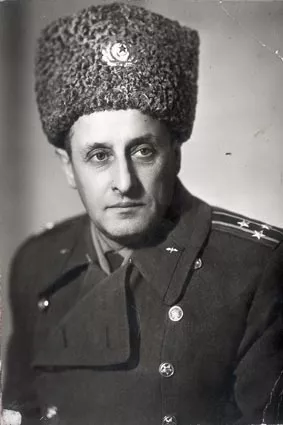This photo was taken in Lipetsk in 1974.
It was taken in a photo studio and I don’t remember what the reason was (most possibly it was my wife who insisted).
In 1952 I graduated from the Academy and went to serve to Lipetsk. I was already married and had a one-year-old child. That place was familiar to me, because during the war our regiment was located there some time.
But at that time we spent all our time at the airdrome and did not manage to see the sights of the city: in the daytime we prepared our planes for fighting starts and at nights we fulfilled those starts. That winter was very snowy: if it was necessary to reach the city, we used sledge.
Now I was going to live in that city with my family. I liked the city. There is a beautiful river Voronezh in it. The city is ancient: it was founded on the place where people mined iron ore in the XVIII century.
I was going to deliver lectures at the Higher Educational Tactical Air Courses. My subject was called Martial Art of Use of Radio-Electronic Equipment. I'll never forget my first lecture. I entered the lecture hall and listened to the report of officer in charge. He was in the rank of colonel, and I was only a senior lieutenant.
I was very nervous. I came up to the table and opened the class-book. I looked at the students and could scarcely believe my eyes: I saw 33 colonels sitting in front of me! But I was carefully prepared for the lecture (I read that lecture at home for imaginary audience!). So everything was fine.
It was always very interesting for me to teach. I understood very well what kind of people I trained. Almost all of them were fighting pilots of high class, most of them overcame all stresses of war.
Besides I knew that knowledge gained from my lectures they would use during flights on the planes of the latest design (if it would be necessary, they would use it during fighting starts).
Soon together with my colleague Kostakov we wrote a textbook Navigation and Sighting Devices. The textbook appeared to be very useful, and it proved to be true absolutely unexpectedly.
Soon after the textbook was published, a group of cadets arrived at our Academy for flying practice. I was introduced to them as the author of their textbook. One of them said 'Do you know where we keep your book?' - 'So where?' - 'We use to sit on it.' And I understood that it was a compliment: if they left the textbook on a table, someone was able to grab and take it for his own.
In the middle of 1960s pilots from the cosmonauts group often came to our Academy. They studied to fly using aircraft technique of the latest design. Flights on modern airplanes trained cosmonauts to be extremely attentive and to take decisions very quickly.
You see, a pilot on board an airplane experiences much greater overload than on board a spaceship. One day Gherman Titov (a USSR cosmonaut #2) visited us. [Gherman Titov was a pilot and a cosmonaut of the USSR, Hero of the Soviet Union and lieutenant-general.
He was born in 1935. His first space flight happened in 1961.] We liked Gherman Titov very much: he was modest, competent, and charming. We took a photograph of our group to keep as a souvenir.
Once at the end of 1960s we had to carry out a very serious mission: to show new aviation technics to the top management of the countries of the Warsaw Pact. [The Warsaw Pact or Warsaw Treaty Organization, officially named the Treaty of Friendship, Co-operation and Mutual Assistance was an organization of Central and Eastern European communist states.
It was established in 1955 in Warsaw, Poland to counter the alleged threat from the NATO alliance.] I had to give them a report on our planes which they were going to buy (to show them to advantage!).
So I gave an hour's talk on new opportunities of the radio-electronic equipment in modern airplanes. I managed. They asked a lot of questions, and after the end of my report there was a public dinner.
My service was very interesting. Time slid by. I served in Lipetsk more than 20 years: I arrived there in the rank of senior lieutenant and was demobilized as a colonel. In Moscow they took into consideration my age and sent us an order about my pensioning off.
For a long time (about 2 years) my chiefs concealed me from the supervising services. They needed me working and it was a great pleasure for me.
At last in 1975 there came another order about pensioning off, and my name was listed. So I had to say goodbye to my friends and students and leave Lipetsk.













